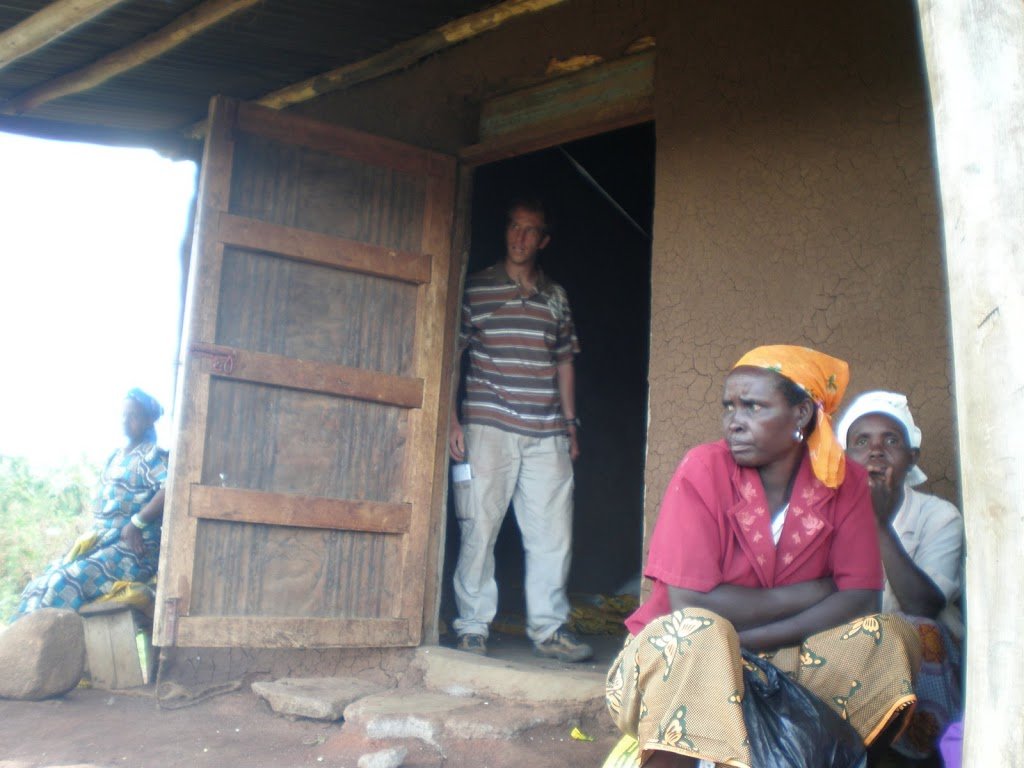Nuru’s farm loan program is a critical foothold program for us here in the community. The loan will enab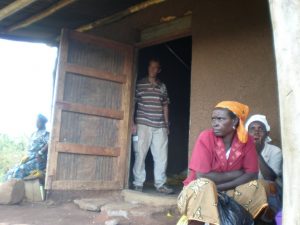 le farmers to become totally self-sufficient in food production for their families and increase their family income. Both of these results help win the battle against chronic hunger and malnutrition here in Kuria. This program involves Nuru purchasing high quality inputs to loan our farmers to empower them to take that first step up out of extreme poverty. Sounds pretty simple right? Wrong. This week was input issue week for our farmers – the exciting week where we distribute the fertilizer and seed. The farmers have been working tirelessly the past few weeks in training and preparation of their farms for this week. The events that transpired this week form a story that I would not have personally believed if I hadn’t been a part of it and seen it for myself here on the ground. I thought I’d take a few minutes and share it with you. I apologize for the length of the post, but wow…this story just had to be told.
le farmers to become totally self-sufficient in food production for their families and increase their family income. Both of these results help win the battle against chronic hunger and malnutrition here in Kuria. This program involves Nuru purchasing high quality inputs to loan our farmers to empower them to take that first step up out of extreme poverty. Sounds pretty simple right? Wrong. This week was input issue week for our farmers – the exciting week where we distribute the fertilizer and seed. The farmers have been working tirelessly the past few weeks in training and preparation of their farms for this week. The events that transpired this week form a story that I would not have personally believed if I hadn’t been a part of it and seen it for myself here on the ground. I thought I’d take a few minutes and share it with you. I apologize for the length of the post, but wow…this story just had to be told.
So in October, I began looking for suppliers for fertilizer and seed (inputs) to loan to our farmers in the program. All the suppliers’ prices were astronomical, though, due to the impending global food crisis. Kenya itself is on the verge of famine. Because of that, the demand for inputs skyrocketed taking the pricepoint with it. So…that left us with the option of sourcing it from the government.
The government sells inputs to farmers through an government agency called the Cereals Board (NCPB) that has branches around the country. The branches act as depots/distributors where farmers can get inputs and also sell their maize after harvest (NCPB acts as a buyer also).
Seed prices are artificially fixed by the government, but fertilizer prices move with the global market supply and demand. Foreign aid allowed the Kenyan government to announce a fertilizer subsidy. This meant a 40% drop in fertilizer prices below the market rate. While extraordinarily helpful, the pricepoint was still well above what the farmers that we work with can afford. Enter Nuru.
We loan the farmers these inputs (fertilizer and seed) so that they can increse their crop yields dramatically (400%-500%). At harvest, the farmers repay the loan and have plenty left over to feed their families for the whole season (families currently go hungry for half of the season) and reinvest in next year’s inputs without the loan. That’s the general concept.
We have 450 farmers in the program…that’s a lot of freakin inputs to buy up front. I had budgeted for a pricepoint slightly above market rate in 2007. With the spike in prices, though, we were way underfunded for the program. So, I had to turn to the mercy of the government’s subsidy. At face value, this subsidy program is a great thing, but, as with most things here, there are complications. The subsidy has caused several problems. Rumor has it that there is currently a scandal going on where MPs (parliamentary representatives) started buying up all the subsidized fertilizer before the subsidy announcement came out to the public in order to control a large percentage of the supply. There was a ripple effect around the country as most NCPB branches began experiencing shortages in fertilizer. There were even instances were riots broke out just north of us because groups of farmers had paid for fertilizer, but when they showed up to pick it up to plant this season, it was gone.
Because of these shortages, scandals, etc., the national NCPB branch in Nairobi was trying to get ANY excuse to cancel large orders of fertilizer. Now, back to our story. When we placed our order in November, we had to submit massive amounts of paperwork documenting every farmer in the program and the amounts they would be receiving. We also had to obtain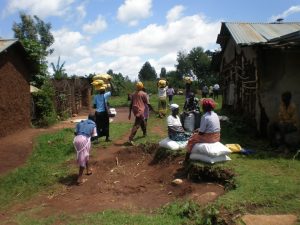 a letter from the Ministry of Agriculture stating that we were, indeed, serving farmers in the Kuria District, and not just buying the fertilizer to sell across the border in Tanzania for a profit. It took me A LONG time and NUMEROUS meetings with the ministry to get that letter. When I showed up at the Ministry for about the 4th or 5th time (mind you, I have to walk an hour to get to this place every time), I was told again that the Division Agriculture Officer (DAO) had stood me up, so, in classic “me style”, I got impatient with the DAO’s assistant manager, came within an inch of threatening his life, and demanded that the office stop yanking us around and write the letter. They reluctantly wrote the letter and put the DAO stamp on it. As you will see, my impatience and baffoonery came back to bite me later.
a letter from the Ministry of Agriculture stating that we were, indeed, serving farmers in the Kuria District, and not just buying the fertilizer to sell across the border in Tanzania for a profit. It took me A LONG time and NUMEROUS meetings with the ministry to get that letter. When I showed up at the Ministry for about the 4th or 5th time (mind you, I have to walk an hour to get to this place every time), I was told again that the Division Agriculture Officer (DAO) had stood me up, so, in classic “me style”, I got impatient with the DAO’s assistant manager, came within an inch of threatening his life, and demanded that the office stop yanking us around and write the letter. They reluctantly wrote the letter and put the DAO stamp on it. As you will see, my impatience and baffoonery came back to bite me later.
I took the letter to the NCPB and they finally allowed us to place the order – assuring me that the order would be in mid-December. We wrote a check for the equivalent of $50,000 to put a down payment on the inputs and place the order.
I went back to the States for a month to do fundraising to pay the balance on the inputs, conduct staff management and training, and a attend Board meeting – returning to Kenya on Jan 6. I returned to find that, not only was our order not filled, but they hadn’t cashed the check yet (very scary because they had “an out” now if they wanted one for denying us the fertilizer we purchased).
I knew that our issue day was Feb 5, so I felt like we had some time. Philip and I went round and round with the Branch and Regional Managers of the NCPB to get the fertilzer delivered and our check cashed. After MANY meetings and phone calls, we finally got the fertilizer into the local branch of the NCPB and they cashed our check on Feb 3. Still no sign of the seed, though, so I made the decision to cancel with NCPB seed order and source a private supplier in a town 3 hours north. Jumping through massive hoops, we were able to source the seed directly with the manufacturer and get it into a holding location in the community on the 4th…ready for issue on the 5th.
I thought we were good now. Just to make sure, I had Philip go to the NCPB and physically touch and see our 800 bags of fertilizer in the warehouse. It was all there. So we finalized the plan for issue day. We ordered the trucks, and mobilized the farmers (an enormous task in itself because only about 5% have any sort of phone).
A little background…our farmers made the decision not to plant tobacco (a cash crop that had been previously harming the environment and their families’ health as well as ripping them off financially). By doing so, they were literally “betting the farm” that we would be able to deliver the inputs to them and that the program will succeed. These families are starving for 25%-50% of the year, and our program provides hope that they will have food all year. To complicate matters, there is a relatively narrow window for the farmers to plant maize and get a good yield because of timing of the rains. So…they were betting everything on the hope that we could deliver these inputs on time for planting. We had trained them in proper ground preparation and planting techniques. All 450 families (appr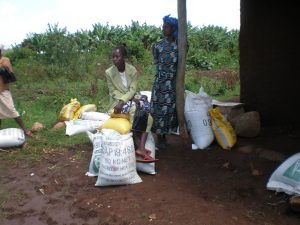 ox 2,500 people) had prepared their farms and were ready to receive their inputs on Feb 5. My staff and the CDC spent hours in meetings planning and conducting detailed coordination with drivers, laborers, the NCPB, and the farmers to ensure the farmers would get their inputs which included approximately 40,000kg of DAP fertilizer and 8,000kg of maize seed. If we failed them, we would cause great harm to the farmers and their families and lose credibility and buy-in from the community – jeopardizing the whole project.
ox 2,500 people) had prepared their farms and were ready to receive their inputs on Feb 5. My staff and the CDC spent hours in meetings planning and conducting detailed coordination with drivers, laborers, the NCPB, and the farmers to ensure the farmers would get their inputs which included approximately 40,000kg of DAP fertilizer and 8,000kg of maize seed. If we failed them, we would cause great harm to the farmers and their families and lose credibility and buy-in from the community – jeopardizing the whole project.
Morning of Feb 5…chaos. Our trucks showed up to pull the inputs out first thing in the morning at 7:00am. NCPB would not release the fertilizer! They said that the national NCPB branch in Nairobi had ordered them to not issue our fertilizer to us. I was already on location at one of the issue points in Taragwiti village. James, one of our Field Officers that was running the loading operation at the NCPB tried to get ahold of me to let me know what was going on, but I was in a serious cell phone dead spot in the village. He sent a runner to get word to me. When I received the message, I was FURIOUS. Nairobi was claiming that we didn’t have the proper paperwork in. I immediately called the national branch. They informed me that they had canceled the order because the letter I had submitted in November from the DAO had the DAO’s stamp and all of the required farmer information, but it WASN’T ON THE RIGHT LETTERHEAD! Are you kidding me????? They were looking for ANY excuse to refuse us the fertilizer. It was now 9:30am. The farmers had shown up at 9:00am ready to go. We had to go into crisis action mode.
I convinced the national branch manager to let us send him another letter on proper letterhead. The manager said that it had to be faxed immediately for approval. The DAO was in Kehancha – 30 minutes away from me. I immediately sent Philip there to talk to the DAO. After much persuasion, he convinced the DAO to write another letter – this time with the “proper” letterhead. We now had to fax the letter to Nairobi. The nearest fax machine was 45 minutes away in a town called Migori. Philip raced to Migori to fax the letter. When he got there, the machine wouldn’t transmit, and we couldn’t get a successful receipt message. Finally, after numerous attempts, the fax went through and Philip raced back. I called Nairobi. They said that they would now release the fertilizer. They faxed a message to the regional NCPB (because the local one didn’t have a fax). The local manager also spoke with the national manager on the phone. The national manager said that in order for the local manager to release the fertilizer, he had to SEE THE AUTHORIZATION FAX WITH HIS OWN EYES!!! I just couldn’t believe it. It was now 11:30am. The farmers were still waiting. The local manager had to drive the 45 minutes to Migori to read and verify the original message. When he reached there, he read the message and then called the local branch to release the fertilizer to us. FINALLY!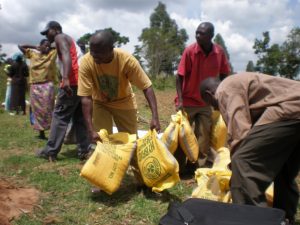
James got the first truck ready for loading, but the other truck was still missing. Andrew (our second Field Officer) tried to locate the other truck. It was “having mechanical problems” and wouldn’t be available. Unbelievable. Andrew scrambled to find another truck that just happened to be going by empty. We hired him, and he went straight to the NCPB to load.
At the end of the day, after several other unbelievable setbacks, all the farmers received their inputs, and I was just left shaking my head in utter amazement. They will begin planting this week. It was a true miracle that the farmers received their inputs on time. Everything that could have gone wrong did go wrong – even after detailed contingency planning. I was so pro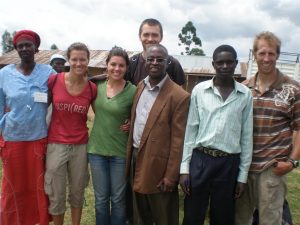 ud of the way that the Kenyan staff went into action as everything was falling apart all around us. I am becoming more and more confident in them by the day that they will be able to completely take over and run this project very soon – and lead their people out of extreme poverty forever.
ud of the way that the Kenyan staff went into action as everything was falling apart all around us. I am becoming more and more confident in them by the day that they will be able to completely take over and run this project very soon – and lead their people out of extreme poverty forever.
So that is how my week ended, and that is the update on the input issue to the farmers. Sorry…kind of long, but I wanted to give you the full insight into our incredible, miraculous week.


